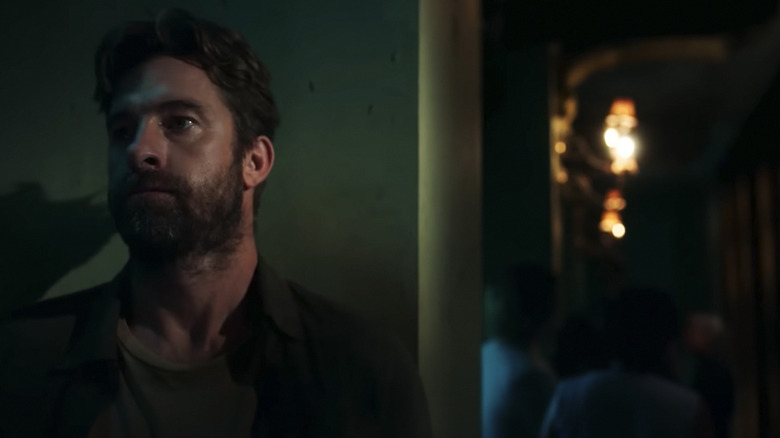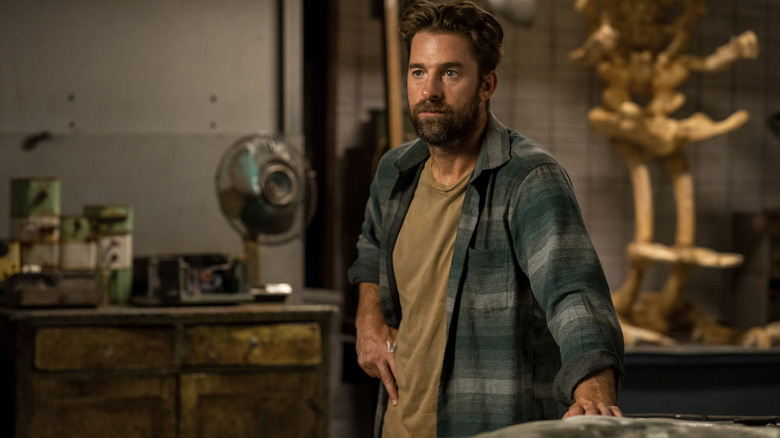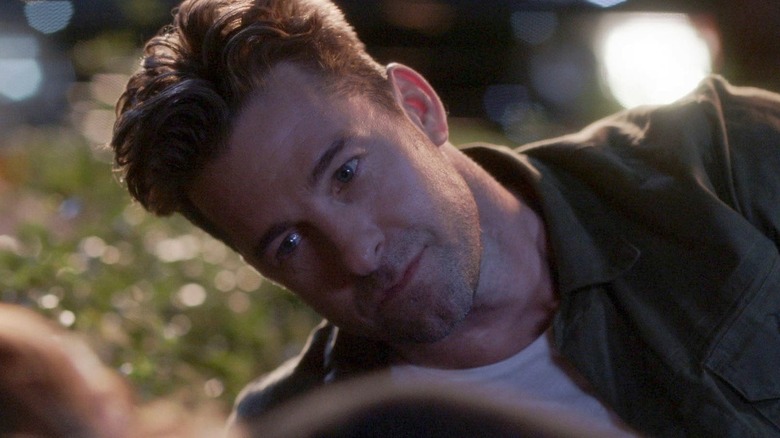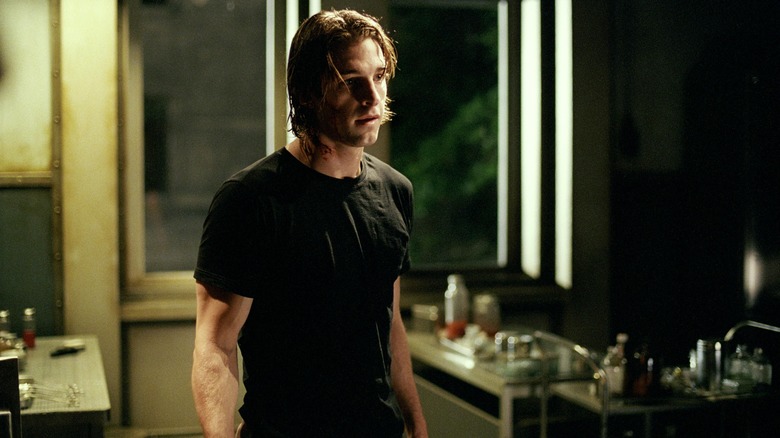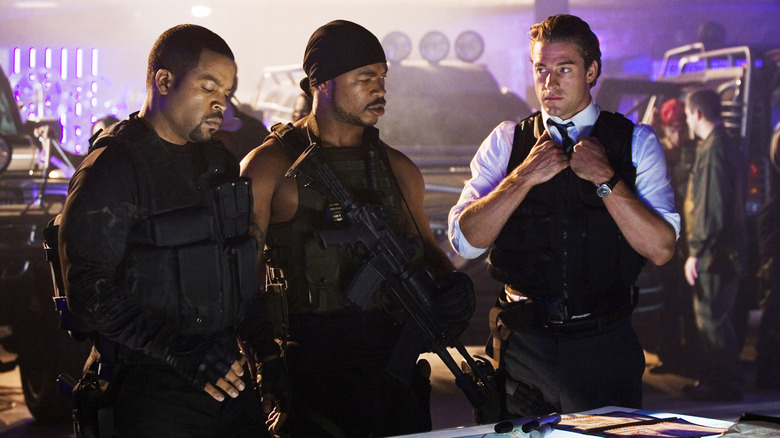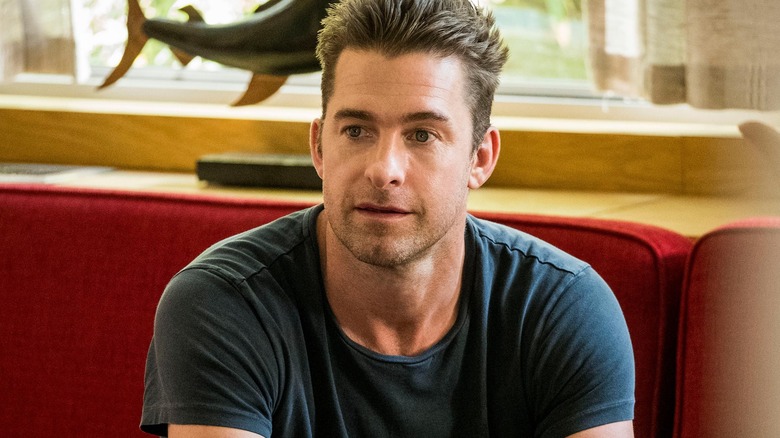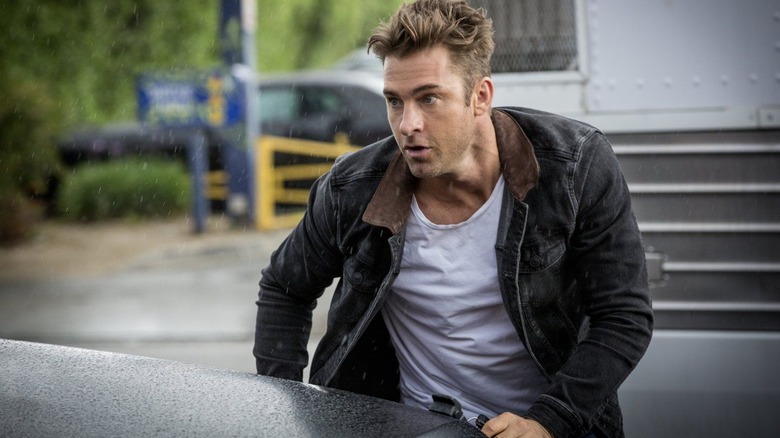Crimes Of The Future's Scott Speedman On Oblique Conspiracies And Activating His Character [Interview]
In David Cronenberg's "Crimes of the Future," Scott Speedman ("You," "Grey's Anatomy") plays a man named Lang Dotrice, a calculating and mysterious character who spends the bulk of the film attempting to initiate contact with a pair of high-profile performance artists in order to donate raw materials to their act. "Crimes" takes place in a near future wherein humanity has carefully ridden themselves of physical pain, leading to a widespread popularity in "aesthetic surgery," performed live for entertainment's sake. Extracting exotic, new internal organs — an equally mysterious and widespread medical phenomenon — is the height of the art world, and Lang Dotrice just may have access to ... many new organs. Housed in the body of his dead son.
"Crimes of the Future" involves mysterious art collectives, illegal medical trading, and a shadowy cabal of government agents who are trying to cover up ... something. Like Cronenberg's films "Videodrome" or "Naked Lunch," the extent or true nature of the conspiracy is never wholly revealed.
Speedman sat down with /Film to talk about Cronenberg, how he came to the project, and how he saved himself headaches by sticking to a very straightforward approach to "Crimes of the Future."
'That's how he wants it'
David Cronenberg's making a new movie. I imagine everybody's excited. What drew you to this right at the start?
It just interested me that David was making a movie. It's not much more than that. He hadn't made a movie in eight years. He'd made a couple of specific types of movies before that and then this movie came around. I don't think he appreciates the term "body horror," but it was something that was evocative of his older movies, those original movies that he started out [making]. It's a throwback to that. That got me really excited. But really, it was just one of those things. I hadn't pursued it too much at all and I woke up one day to an offer in my inbox from the producer, Robert Lantos, who I'd worked with a couple of times. Obviously, you're thrilled to get that email, and then you read through the script and you see it's this wonderful, crazy hypnotic, weird story. Your part in it is really substantial and very weird and challenging at the same time. It was one of those things that, in a 25, 30-year career, doesn't happen all that often. It was definitely an exciting moment.
Your character Lang, is emblematic of something that happens in a lot of Cronenberg movies, especially going back to the earlier ones you were talking about, stuff like "Videodrome," stuff like "Naked Lunch" — there's always this element of conspiracy. There's some weird paranoid organization going on and I feel like Lang is the center of that. He's the voice of these weird conspiracies. But Cronenberg also likes to keep those things very oblique. He never explains what the conspiracy is in its entirety. You get little pieces of it. As an actor, were you given information about the broader structure of the conspiracy, or was that something you got to bring to it or were you encouraged to keep it mysterious?
No. David's available for anything you want to talk about. But he doesn't deem it necessary and he doesn't do rehearsal. You get the feeling early on — and I'm the same way — talking about stuff, it's not my favorite way to activate a character. You know what I mean? I prefer to go on my own and walk around for hours at a time or work with this person on the behavior, the physicality, or whatever you want for the character. But that's what I deemed early on with David, too. That's how he wants it. He doesn't want to beat you over the head with what he's trying to say or do. Because I'm not sure he's entirely sure what that is.
'To me, maybe it was little mysterious'
He's trying to make something that resonates. He doesn't want to sit down and explain every little thing to the audience or me, or himself, really. That's what keeps everything artistic and light and you keep inventing and reinventing and figuring it out. But in terms of the conspiracy element, I didn't really look at it as a conspiracy element. I looked at it as a pretty practical underground movement that I understood, that was trying to take hold of his moment in time, with the death of his son, and use that to get his message of what he wants out to the world. To me, maybe it was a little mysterious, vague. But the conspiracy part, I always felt was this government part, the government censorship or they were going to control the organs that we were having and registering. That to me felt like the more broader conspiracy parts of the story to me.
I look at Lang and I thinking of other underground movements. This is also very much about the art world, but also the government. Your character is in this weird crux of artistic underground and political underground. I wanted to ask if there's some underground movements that you were modeling or evoking when you were playing Lang?
Not really. I went back and watched "The Weather Underground," [a] documentary that I love so much. It's crazy to think about when you look at, where the far-left was taking things in the '60s and '70s, accidentally blowing up West Village condos or buildings or brownstones or whatever it was. Seeing that happened not that long ago and these movements were going on, and very much underground, and it was a real thing for a number of years. It was stuff like that, that politically coalesced with where I was and I could see myself. You're always trying to figure out how you're going to activate a character. I could see myself, in the right place, right time, being involved in something like that or understanding what those things were. That's all you're trying to do with that.
Keeping it light
You mentioned earlier that while you're working on your process, the tone on the set is actually light. But this is an incredibly downbeat movie. What was the general tone on the set? Was it really light at the time, or were there really heavy moments?
Anytime you're doing the death of a child, to activate those scenes, that's going to be, for me anyway, a harder day. But David, I think, just generally likes to keep things light. Viggo's the same way. I remember reading about Jeff Bridges way back saying, "When you have to go to these darker areas, sometimes having humor on set and joking between takes and keeping things light allows you to take things further in one way." But also, it is a very specific world, in terms of the worldbuilding this movie does. But also, there is a lot of levity in it to a certain degree. When I was watching the movie again, I was cracking up watching it. What Don McKellar is doing and Kristin Stewart and that whole scenario, that seemed really funny to me, too.Viggo's quite hilarious at times.
I think it is somewhat of a darker movie, at times, obviously. But he's exploring many different things. It's not just, to lock it down and just say there's this one environmental allegory or metaphor of what he is trying to get in here thematically. But he seems to be commenting on a lot of modern society and where we're headed.
'It's easier because you just give up'
Your character has a wife in this movie, the character of Djuna. But you don't have any interaction in the movie. Was there any discussion with Lihi Kornowski, who played Djuna, or were you deliberately trying to keep yourselves apart?
No. I think she shot when I wasn't even there. I must have been there, but she shot very quickly over two days and was gone and I didn't even meet her until we got to France for the festival. That was great to meet her and I thought she was incredible in the movie, to be honest, I thought she was really good. It worked really well. But there was no discussions with her or no discussions with David or anything. It was just, "Here's the actor playing her." "Cool." And then, see each other when you do. It sounds a little haphazard. But I do think there's a strange alchemy to David's movies, where he's not as controlling as some other directors, who are micromanaging and want to control this, that, and the other, and does a lot of rehearsal and it's very exacting and doing 60 takes per shot and all this type of stuff. We would do one or two takes. That's the kind of style he has and it seems to work out very well.
It seems like working for a director with an established style, like Cronenberg, would be a lot easier for an actor, because you know what to expect at one point.
Yeah. It's easier just because you just give up. You're going to be in this movie, it's really his movie. Like any director, it's always their movie. But you just feel so much more at ease. Because he's made many movies and he's such a great director and it's going to be a David Cronenberg movie. There's nothing you can do but just sit back and enjoy it. That's what I'm trying to do. My younger years, you fight against stuff and you're more anxious and nervous about certain things, in terms of directors. But now, unless you're willing to do it, it's their medium. It's a film medium. It's their job. You got to go with it.
No one was grossed out
When you're getting into that space, like you said, you knew Cronenberg's work. But did you have to do Cronenberg homework? Become a little bit more familiar with the kinds of ideas he works with? Or was it just more about looking at the part?
Yeah. Just looking at the part. Because I don't want to get too intellectual about it and get too bogged down in theme and what he's trying to say, what this is. I'm enjoying that, and I've sat here doing interviews with him and I love hearing him speak about all that. That's been great. Because I didn't do a lot of that and it's fascinating to hear him speak. Because basically, also he's a filmmaker, he's an artist, but he's also a scientist, clearly, on some level. He's a very, very, very intelligent man, and I love hearing about that. But again, that's the beauty of doing the movie with David Cronenberg, is he really is going to take the brunt of all of that. You can just go for the ride.
Apologies for asking about stuff like theme. But this movie invites that. It is a very cerebral film.
It is. It definitely is.
You said you got to see the premiere in France. I know a lot of these Cannes screenings are notorious. A lot of people like to talk about walkouts or 20 minute standing ovations. I'm curious what your experience was. What was it like, seeing it with an audience for the first time?
I've been lucky enough, this is my third time having a movie in Cannes. It's always somewhat a similar experience. It's a lot of intensity and a lot of beautiful things about film, but it's a lot of silly things about movies too, with the hype and the craziness that goes around at a film festival. To be honest, this movie really didn't have any walkouts and it really was a very beautiful screening. I don't think it could have gone better. We had a nice standing ovation. People seemed to really understand, and get the movie, and appreciate the movie and appreciate David. But you can tell that it just went very well. It was a nice screening. I think, some of the anticipation — because of the previews that had come out and some of the things that were being said — that there were going to be these walkouts and this gross-out movie and people aren't going to be able to handle it and all this. I never personally felt that was really what was going to happen at all. And it didn't.
The marriage between art and commerce
It's a curious claim, because, despite there being a lot of rough medical imagery, "Crimes of the Future" clearly isn't an exploitation movie.
It's not an exploitation movie at all. It never set out to be. It wasn't going to be that. I think the trailers Neon are doing are amazing and really evocative and interesting. But the movie, as people will see, is somewhat more hypnotic and meditative than that.
The reports of disgust are greatly exaggerated.
I think so. They really were. David said this, too, the only person that walked out was him. Because he had to go to the bathroom. That was it ...
Looking over your filmography, you act in many different kinds of movies. You've played a very wide variety of roles. You're open to acting in all genres of movies: "XXX," "The Vow," "The Strangers." But what kind of movies do you watch? Are you drawn to all of these kinds of films a filmgoer, or do you just to challenge yourself as an actor?
It's both. Once I'm in a movie, pretty much you cease to be a viewer again, at that point. I'm a movie buff for sure, and I love going to movies and I love going to everything. I can't wait to see "Top Gun: Maverick." I want to see that. I want to have that experience, and those are the type of movies I was weaned on, these '80s movies, blockbusters. But also, movies like David's movies that they used to make, that were commercial movies, like "The Fly," or a little smarter, more intelligent movies, that were about interesting things. I love those too, that marriage between art and commerce that we used to do a little better than we're doing right now on a bigger scale. Those are my favorite things to see.
But in terms of acting, then that's a whole different conversation. Because I look at acting like athletically, and you want to challenge yourself and get better and better and better and stretch more and get faster and all that stuff. Something like ["Crimes of the Future"] is just an opportunity to be with a master and one of the greats and go for it on a really dangerous level. This is an edgy, weird, crazy part, that was really fun to sink my teeth into.
"Crimes of the Future" is in theaters now.
